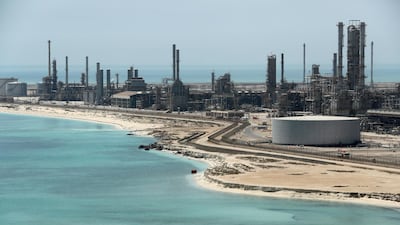Oil prices jumped after drone and missile attacks in Saudi Arabia on Sunday, one of which targeted the main export terminal at Ras Tanura in the kingdom's eastern province.
"One of the petroleum tanks at Ras Tanura Port in the Eastern Region, one of the largest oil shipping ports in the world, was attacked this morning by a drone coming from the sea," the Saudi Press Agency reported, quoting a Ministry of Energy spokesman.
A separate attack on a Saudi Aramco residential district was thwarted by the kingdom, the official said.
Houthi rebels from neighbouring Yemen, who claimed responsibility for a 2019 attack on Aramco installations, said they were behind the latest incidents.
"Shrapnel from a ballistic missile fell near Saudi Aramco’s residential area in the city of Dhahran, where thousands of the company’s employees and their families from different nationalities live," said the official.
"Both attacks did not result in any injury or loss of life or property."
Brent, the international benchmark under which two thirds of the world's oil is traded, jumped as much as 2.7 per cent to $71.17 at 6.37am UAE time on Monday before falling back to $69.63 by 1.19pm.
West Texas Intermediate, which tracks US crude grades, rose by 2.6 per cent to $67.81 before settling at $66.36.
Oil prices were already at their highest point since the middle of 2019 before the latest attacks, after the 23-member Opec+ group extended oil output restrictions of 7.2 million barrels per day, equal to about 7 per cent of oil supplies, last week.
The group exempted Russia and Kazakhstan, which were allowed to make small output increases.
Saudi Arabia, which leads the alliance alongside Russia, also decided to extend its outsize voluntary cut of 1 million bpd until the end of April.
The Ras Tanura complex in Saudi Arabia's oil-rich Eastern Province is the world’s largest oil terminal and can export about 7 per cent of the world's oil supply.
It consists of a port and export terminals for crude and liquefied petroleum gas.
The terminal, which plays a critical role in exporting Saudi crude grades to global markets, can store 33 million barrels of crude.
Aramco, the world's largest oil-exporting company, loads its main crude grades and condensate, a liquid associated with the production of natural gas, from this terminal.
The oil company was forced to shut 5.7 million bpd of production – or 5 per cent of global supply – in September 2019 after a refinery in Abqaiq and oilfields in Khurais were attacked by drones and cruise missiles.
Oil prices briefly rose by 19 per cent after the attack but Aramco was able to restore supply to the markets fairly quickly.
"Such acts of sabotage do not only target the kingdom ... but also the security and stability of energy supplies to the world, and therefore, the global economy," the energy ministry official said of the latest attacks.
"They affect the security of petroleum exports, freedom of world trade and maritime traffic."
Arab countries and the secretary general the Organisation of Islamic Co-operation condemned the attacks on the kingdom.
The attack on Ras Tanura is the latest in a series of attacks on Saudi oil refineries and terminals, as well as tankers passing through the Strait of Hormuz.
Houthi rebels were also said to be behind an attack an attack on an oil tanker off the western coast of Saudi Arabia in November.









